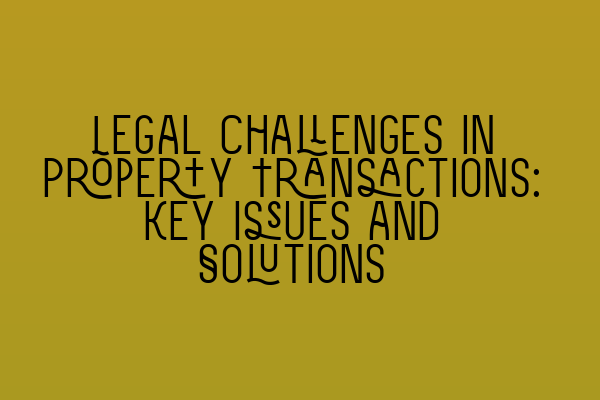Legal Challenges in Property Transactions: Key Issues and Solutions
When it comes to property transactions, there are various legal challenges that can arise, causing delays, complications, and potential disputes. As a solicitor specializing in property law at SQE Property Law & Land Law, I have seen firsthand the importance of addressing these challenges effectively to ensure smooth and successful transactions. In this blog post, we will explore some of the key issues faced in property transactions and offer practical solutions to overcome them.
1. Title Issues:
One of the most common legal challenges in property transactions relates to title issues. These issues can range from incorrect property descriptions to missing or defective title deeds. It is crucial to conduct thorough due diligence to verify the title and address any potential issues before proceeding with the transaction. This may involve carrying out searches, obtaining statutory declarations, or applying for indemnity insurance to mitigate risks associated with title defects.
To test your knowledge of contract law, check out our Interactive SQE Mock Tests for Contract Law: Test Your Knowledge for a comprehensive understanding.
2. Planning and Building Regulations:
Compliance with planning and building regulations is another significant challenge in property transactions. It is essential to ensure that the property has the necessary planning permissions and building regulations approvals for any changes made to the property. Failure to do so can result in enforcement action or restrictions on future use. Working closely with planning consultants and conducting thorough checks and searches can help identify any potential issues and resolve them promptly.
3. Financing and Mortgages:
Obtaining financing and mortgages is a critical aspect of most property transactions. However, securing financing can be a complex process, especially if there are issues with an applicant’s credit history or the property itself. Engaging the services of a specialist mortgage broker can help navigate the intricacies of mortgage applications and identify alternative financing options if traditional lenders are unwilling to provide finance.
For a comprehensive understanding of parties’ rights and responsibilities in a contract, refer to our article on Parties in a Contract: Rights and Responsibilities.
4. Environmental Concerns:
Environmental considerations have gained significant prominence in recent years, and potential contamination or other environmental issues can impact property transactions. Conducting environmental searches and obtaining environmental reports can help identify any potential risks and allow for appropriate measures to be taken to mitigate them, such as implementing environmental remediation measures or seeking indemnity insurance.
5. Leasehold Issues:
Leasehold properties often pose unique challenges and can be subject to various legal issues. These can range from service charge disputes to restrictions on alterations or lease extensions. It is crucial to carefully review lease agreements, understand the rights and obligations of both landlords and tenants, and seek specialist advice to address any leasehold issues effectively.
Understanding the concept of duress and undue influence in contracts is crucial in resolving any disputes that may arise during property transactions. Learn more about it in our article on Unveiling Duress and Undue Influence in Contracts.
6. Chain Issues:
Property transactions involving multiple parties can be challenging to navigate, particularly when there is a chain of transactions. Delays or complications at any point in the chain can have a domino effect, affecting the entire transaction process. It is crucial to maintain regular communication with all parties involved, engage the services of experienced conveyancers, and have contingency plans in place to address any potential issues that may arise.
7. Compliance with Anti-Money Laundering Regulations:
Compliance with Anti-Money Laundering (AML) regulations is essential in property transactions to prevent illicit activities, including money laundering and terrorist financing. Solicitors have a legal duty to conduct thorough client due diligence and implement robust AML procedures. Failure to comply with AML regulations can lead to severe consequences, including prosecution and reputational damage.
To understand the essentials of consideration in contracts and its role in property transactions, read our article on Essentials of Consideration: Understanding the Backbone of Contracts.
In conclusion, property transactions can be complex and fraught with legal challenges. However, by addressing these issues proactively and seeking specialist advice when necessary, it is possible to overcome these challenges and ensure successful transactions. At SQE Property Law & Land Law, our team of experienced solicitors is dedicated to guiding clients through the intricacies of property transactions and providing effective solutions to mitigate risks and achieve desired outcomes.
For a comprehensive understanding of assessing financial compensation in contract disputes related to property transactions, refer to our article on Damages in Contract Law: Assessing Financial Compensation.
Contact us today to speak with one of our expert solicitors and discover how we can assist you in navigating the legal challenges in property transactions.
Disclaimer: This blog post is intended for informational purposes only and should not be construed as legal advice. Please consult with a qualified solicitor for professional advice tailored to your specific situation.
